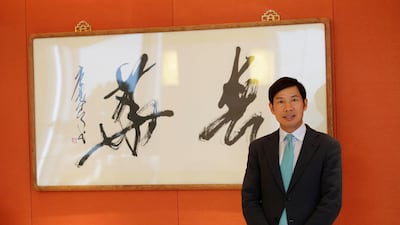Primavera Capital Group, one of China's largest private-equity firms, is paying closer attention to domestic opportunities in sectors such as health and technology in the face of stricter capital controls at home and rising protectionism overseas.
This year alone, Primavera joined a US$1.1 billion fundraising round for Koubei, the Alibaba Group Holding online-to-offline commercial services platform. It has also taken a stake in Zhejiang Dasouche Finance Leasing Company, the largest service provider for second-hand automobile merchants in China.
"We are doing more investments with entrepreneurs, taking equity stakes in growth companies," says Primavera's co-founder and chairman, Fred Hu, a former head of China at Goldman Sachs Group.
As a Goldman banker, Mr Hu helped to restructure China's biggest financial services companies, including Industrial and Commercial Bank of China and Ping An Insurance Group.
He set up Primavera in 2010 and now helps to manage $8bn in funds. He has been carving out a niche for the group as the go-to firm for domestic entrepreneurs, state enterprises and even foreign investors looking for strategic help.
In September, Yum Brands selected Primavera and Ant Financial Services Group, Alibaba's payments services arm, to take a 4 per cent pre-IPO stake in its spin-off, Yum China Holdings.
Mr Hu was named the board chairman of Yum China, which operates more than 7,600 KFC and Pizza Hut restaurants in the mainland.
Investing with China's over-cashed private equity and venture capital world is a challenge, especially at a time when a regulatory clampdown in China and rising protectionist rhetoric globally mean most firms are scouting for domestic opportunities rather than overseas ones.
"There's a lot of capital sloshing around," says Mr Hu. "Managers are aggressively chasing certain deals and valuations have been driven too high."
PricewaterhouseCoopers estimates fundraising increased 48 percent last year to $72.5bn.
"It's inevitable that mistakes will be made," Mr Hu says.
Mr Hu set up Primavera with the former Goldman Sachs managing directors Haitao Zhai, Kenneth Wong and William Wong. Its limited partners include institutional investors such as Second Swedish National Pension Fund, Pennsylvania State Employees' Retirement System, Taiwan Semiconductor Manufacturing, Finland's Varma Mutual Pension Insurance, Metlife, State Street, AIA Group and Bank of China.
The firm's top deals include being an anchor pre-IPO investor in Alibaba, and taking stakes in its sister companies, including Alipay and Cainiao, an Alibaba-backed logistics company.
Mr Hu grew up in rural Hunan and in 1978 participated in China's first university entrance examinations after the Cultural Revolution. He was admitted to the prestigious Tsinghua University and later earned a doctorate at Harvard University.
"It was a one-in-a-million chance," says Mr Hu, who was only 15 years old at the time.
His 14-year career at Goldman Sachs – first as a regional economist, and later as a top deals' adviser and regional chairman – gave him a front-row seat in the most momentous period in China's economic reform. He was a principle banker in the listings of Ping An, ZTE and Bank of China. The restructuring of ICBC was a single defining experience, he says.
"It is the biggest bank of China, the stakes were so much higher and the obstacles were much greater," says Mr Hu, who pushed Goldman Sachs to invest in ICBC, rather than act as an adviser.
At a time when many investors were sceptical, he was willing to push forward, says ICBC's former chairman Jiang Jianqing.
"I met with more than 40 well-known domestic and foreign bankers and executives to talk about investing in ICBC, but their response was generally cold," says Mr Jiang.
Mr Hu maintains that China still "punches below its weight" - even after an unprecedented corporate buying spree - and over time it will be a big capital exporter to the world.
"There's still interest and appetite for Chinese companies to do deals in global markets," he says.
"But in the near term, capital controls and uncertainty about protectionism are significant hurdles to overcome."
* Reuters

